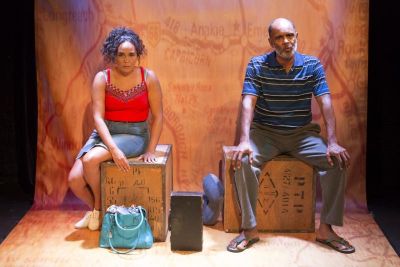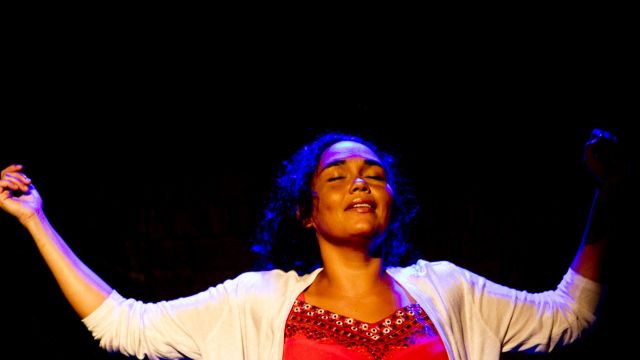Which Way Home
Though billed as ‘Indigenous theatre at Belvoir’, Katie Beckett’s play is a story about family, a story of tender memories and sensitive frustrations with which we can all identify. It’s a story of unconditional love, written and performed by a daughter who skilfully shares her special relationship with her father. Inspired after his last heart attack, Beckett’s play is a gift to a father who has been “my dad, my mum, and at times my best friend”.
The Downstairs Belvoir stage provides the intimacy. And the simple set of a map of southern Queensland and northern New South Wales, two tea chests, an Esky and an hour long trickle of sand – is all that is needed to take Beckett and her father, played by Tony Briggs, on a special road trip back to country via memories and unanswered questions about the past.
Rachel Maza’s direction has eliminated the unnecessary miming of driving or opening and shutting car doors. The action itself is clear enough. So too are the transitions from journey to memory. Each short scene has been carefully crafted, using an economy of words that adds to its poignancy, especially in the hands of such sensitive and skillful performers. Deft pauses and moments of quiet eye contact establish the depth, warmth and humour, as well as the irritations and disappointments, that are inherent in any close relationship.

Beckett plays herself without becoming herself. Her character, Tash, is the consummate daughter, clicking her tongue as her father throws his fantail wrappers on the floor, but lovingly aware of his aches and pains as she takes him ‘home’. Tears brim at some difficult moments, but, as with so much indigenous writing, are brushed way with the clever introduction of humour in a quickly following scene.
Briggs is, as always, a strong presence on the stage, his character manifesting itself in slow smiles that shine in his eyes and carefully relaxed movements that underline the experience and age of the character – and the actor. He re-lives some moments with quick anger and passionate realism; and injects others with sparkling wit. The father Beckett writes about with love is very clear in his interpretation.
Short but moving, this play is, in Maza’s words: “a universal human story that transcends race, time and place”.
Carol Wimmer
Photographer: Brett Boardman
Subscribe to our E-Newsletter, buy our latest print edition or find a Performing Arts book at Book Nook.

